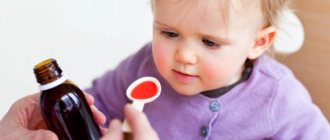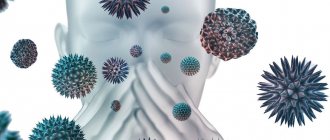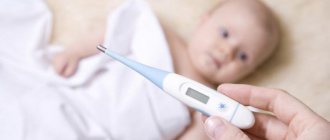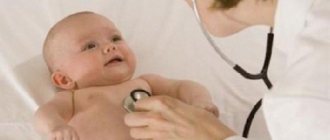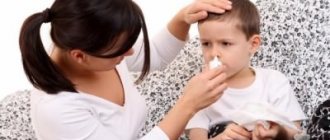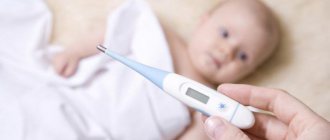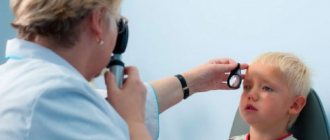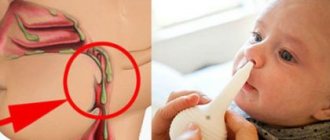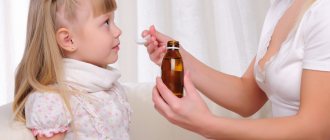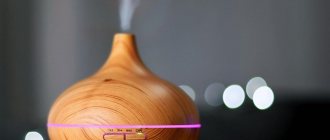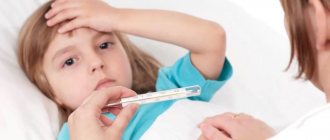What is a wet cough
In general, this is simply a protective reflex of the body, the task of which is to remove foreign objects or substances from the respiratory tract:
- small bodies;
- dust;
- sputum;
- bacteria.
There are usually two types of cough: productive and non-productive. The latter - known as “dry” - is characterized by the fact that, despite muscle contractions, it does not remove any foreign objects from the paths. This is the most debilitating type, especially when it comes to children. A productive, or wet, cough is not so dangerous, since it performs a useful function - it removes secretions from the respiratory tract, thereby easing the course of the disease.
If the cough is bacterial in nature, this symptom is aimed at cleansing the child’s body of pathogenic bacteria
Both non-productive and wet coughs are just symptoms that signal a certain disease. That is why the child must first be examined by a doctor. A disease detected in a timely manner is much more treatable and does not produce severe side effects.
When to sound the alarm
A slight cough is not always a harbinger of serious complications. It is worth understanding that a cough can be the result of:
- allergic reaction;
- staying in a dusty room;
- ingress of small crumbs or food particles.
Sometimes the cause of coughing is common dust
In all these cases, it is worth eliminating the causes of the cough. For example, take allergy medication or remove all objects that accumulate dust from the room. This type of cough does not require special treatment and is a natural reaction of the body to an irritant.
There are a number of characteristic signs that indicate the need to see a doctor:
- cough accompanied by shortness of breath;
- the temperature does not drop below 38 for several days;
- wheezing is heard during coughing;
- sputum has an unusual color or consistency;
- the child complains of chest pain;
- cough lasts more than a week.
If the temperature persists for a long time, self-medication is dangerous, you need to show the patient to a doctor
A timely visit to a doctor will not only reduce the risk of complications, but will also significantly shorten the treatment period. At the first alarming signs, you should immediately show the child to the doctor. Sometimes ordinary symptoms hide signals of more serious illnesses. For example, about problems with the cardiovascular system.
In any case, a specialist will help you choose the optimal treatment plan.
Parents' advice
A wet cough without a runny nose does not always require treatment, especially when it occurs intermittently. Many doctors believe that in this way the airways are cleared of mucus produced. When a runny nose is present along with a cough, and such symptoms bother the child for more than a week, it will be difficult to manage without medication. In addition to medications used for a runny nose without fever, doctors recommend that parents monitor nasal hygiene and follow some rules that will help increase the effect of treatment.
- Drink plenty of fluids. To expel mucus and thin it, it is recommended to drink a lot of warm liquid, this can be milk with butter, tea, or fruit juice.
- Optimal room temperature. The air temperature should not exceed 20 °C.
- Proper and nutritious nutrition.
- Compresses, use of warming ointments: Doctor Mom, Pulmex baby. Helps improve mucus discharge.
- Rinse the nose with saline solutions - 4 times a day.
- Use any medicine for a child only after consulting a pediatrician.
- If a runny nose with cough appears against the background of an allergy, you need to identify and eliminate contact with the allergen.
A runny nose, as well as a cough, are not uncommon among children, so parents should not ignore them. The sooner the cause is known, the greater the chance of successful recovery. A timely visit to a pediatrician and monitoring the child will help to recognize the disease in time and eliminate all possible risks of complications.
source
What does a productive cough indicate?
Before treating an illness, any doctor will conduct a thorough analysis of the patient’s condition. For this reason, parents should provide the doctor with all possible information about the course of the disease:
- time of onset of the disease;
- temperature;
- general condition of the patient;
- presence of other symptoms.
A doctor can diagnose pneumonia even by the color of sputum.
In addition, the color of the mucus also plays an important role. Regardless of age, the consistency and shade of sputum can tell a lot about possible diseases. So, if a child coughs up phlegm:
- abundantly, while the color is light and there is no odor - bronchitis or tracheitis is possible;
- reddish color – pneumonia;
- watery discharge – inflammation of the respiratory tract;
- glassy mucus, viscous in consistency - bronchial asthma;
- bloody secretions - indicate heart failure or tuberculosis;
- discharge with pus – lung abscess.
Only a doctor can establish an accurate diagnosis and select the appropriate treatment! Most often, the cause of the symptom itself is first eliminated, and only then the cough is treated.
To make a diagnosis and prescribe treatment, the doctor must conduct a comprehensive examination of the baby.
How to cure a wet cough in a child and what you need to know
First of all, you need to remember that while the treatment for a two-year-old child and a one-year-old may be the same, then children over 3 years old are prescribed completely different medications. The permissible dosage of medications, as well as their form, depends on age.
You can quickly cure a cough only by getting rid of its cause - the disease. However, during the development of the disease, the discomfort from the symptom can be significantly reduced.
First of all, it is necessary to facilitate the coughing process. Constant spasms can cause a sore throat and irritation of the mucous membranes, so children are given medications to thin mucus, speed up their elimination and soften the mucous membranes.
The prescription of the drug depends on the age of the child, this must be taken into account
It is important to remember that if a lot of sputum is produced, then its removal should be accelerated as much as possible. The accumulation of mucus will lead to significant changes and may negatively affect the bronchi.
How to treat a runny nose and cough without fever in a child
Having found out the cause of a wet cough, it is worth carrying out the necessary treatment. Depending on the cause of occurrence and accompanying symptoms, treatment will differ in both duration and prescription of drugs or traditional methods of treatment.
How to treat a wet cough with a runny nose
To treat a wet cough with a runny nose without fever in a child, priority should be given to the treatment of rhinitis. It is worth understanding that the origin of a wet cough in this case is associated with copious secretion of sputum from the nasal passages, which during sleep flows down the walls of the larynx, entering the bronchi. When a child assumes a vertical position, the bronchi begin to actively contract in order to push the accumulated mucus out, which is why attacks of wet cough intensify in children in the morning and after naps. To treat a runny nose, pediatricians prescribe vasoconstrictor medications that can remove swelling and excessive nasal discharge, which are especially useful at night to ensure your child has a restful, healthy sleep, without nasal congestion. Vasoconstrictor drugs include Vibrocil and Nazol Baby drops. The doctor may also prescribe mucolytic agents aimed at thinning sputum. There is a need to take mucolytics only if the child cannot cough up sputum normally due to the density of the secretion. If coughing is not difficult, a mucolytic is not prescribed. The most common drugs in domestic pediatrics are Ambroxol, Ambrobene, marshmallow syrup, etc.
How to treat a wet cough with ARVI
In fact, the treatment of cough and runny nose during ARVI is similar to the treatment of wet cough and runny nose during a cold, but is supplemented by the prescription of antiviral drugs, which the doctor selects individually in each case. Children are prescribed antiviral drugs based on interferon, or homeopathic remedies aimed at using atypical mechanisms for activating the immune system - for example, Aflubin. In the presence of cough, runny nose and fever, the use of antipyretics will be relevant if the temperature exceeds more than 39 °. With proper treatment, cough and runny nose will be a thing of the past after 7 days from the moment of illness. If symptoms persist, you should additionally visit a doctor who will prescribe treatment for complications of the disease.
Treatment methods for cough in children
Before moving on to a discussion of therapeutic methods, it is worth mentioning ways to alleviate the condition during illness. If the child is 2 years old or younger, you can use harmless inhalations based on natural herbs. Moist steam will soothe irritated mucous membranes, and evaporation of infusions and herbs will improve the patient's condition.
Syrups can be used as prescribed by your doctor. They come in three types:
- for dry cough;
- for wet cough;
- combined.
It is strictly forbidden to take a remedy against a dry cough for a wet cough and vice versa! Not only will this not help cure a child’s wet cough, but it can also significantly worsen the condition. The mechanism of action of such drugs is different, so they have different effects on the body.
Treatment
During illnesses of bronchitis, pneumonia and other diseases, when a child has a strong wet cough, it is recommended to include in treatment medications that help thin the sputum - mucolytic drugs , or help separate it - cough expectorants . There are natural and artificial remedies.
Most parents try to use medications that are not of natural origin as little as possible when treating their child. But you still need to know that absolutely every drug, even the most expensive, will have side reactions and other contraindications. When choosing the right treatment, you should first consult a doctor to know what reactions to expect after taking a particular medicine.
All cough medications are divided into the following categories:
- antitussives or combination drugs are recommended for dry, unproductive cough;
- expectorants are prescribed for a productive cough, when the sputum is not thick or stringy;
- Mucolytic drugs are also used for productive coughs, but with thick and viscous sputum.
The composition of most medications has a complex structure, including both beneficial herbs and components, and harmful chemicals. In addition, the child may be allergic to certain medications. In this regard, it is important to select medications depending on the developmental characteristics of your child’s body.
Treatment with antitussive drugs in parallel with mucolytic drugs is prohibited.
Expectorants
Expectorants stimulate expectoration and are divided into:
- Drugs with a reflex action - such drugs contribute to irritation of the stomach area, this leads to stimulation of the vomiting center, but vomiting does not occur, mucus is produced more strongly in the respiratory tract. The efficiency of the epithelium increases, which removes sputum from small and large bronchioles. In the end, the effect of such drugs leads to better coughing up of mucus and the elimination of moisture from the bronchi;
- Resorptive drugs - after these drugs are absorbed by the body, they provoke irritation of the lining of the bronchi, promoting its rapid elimination.
Treatment with reflex-action drugs of the thermopsis category should be carried out with caution; the dosage must be determined correctly, otherwise the child may have an overdose: general intoxication and vomiting.
Althea
Althea preparations are taken for chronic or acute diseases of the respiratory system (bronchitis, pneumonia). Expectorants based on marshmallow herbs stimulate the liquefaction of bronchial secretions and stop the inflammatory process. This group of drugs includes:
- Mucaltin - one tablet is dissolved in half a glass of warm water;
- Althea roots - used as an infusion, 1 tbsp. spoon into a glass of cold water, boil for about 12 minutes, then cool. Take about four times after meals;
- Alteyka syrup - taken orally when the meal is completed; for children under ten years of age, give 1 teaspoon diluted with water to a quarter of a glass 4 times a day. Children over 1st century. spoon in half a glass of water. The duration of treatment is 14 days.
Thermopsis
- Thermopsol cough tablets are prescribed for coughs when sputum is poorly separated, take 1 tablet three times a day, course 5 days;
- Codelac Broncho with thyme is prescribed due to difficulty in sputum separation, not recommended for children under 12 years of age, given with meals 1 tablet 3 times a day, course no more than 4 days;
- Plantain leaf, coltsfoot, wild rosemary and others - Plantain leaf is a strong expectorant medicine, prepare a tincture and take two tablespoons 30 minutes before meals 3 times a day, course 10 days;
- Ledum herb also use infusion (two tablespoons of herb diluted with 180 ml of hot water) three times a day, half a glass;
- Plantain and coltsfoot syrup - do not take for children under 5 years old; for children over 6 years old, give two tsp. 4 times a day, treatment duration is about two weeks;
- Stoptussin phytosyrup - do not give to babies under one year old, to children under 5 years old 1 tsp, to children under 10 years old 2 tsp 3 times a day.
- Be sure to read: cough herbs for children
What medications to use
As for drug treatment, the choice of drugs depends entirely on the doctor. The specialist will select the optimal set of medications in accordance with:
- the patient's condition;
- his age;
- presence of personal intolerance to components;
- other medications.
The choice of medication directly depends on the age of the child
You need to understand that simple coughing and prolonged attacks should be treated differently. In general, a child can cough up to 15 times a day and this is normal - the structure of the throat in children is such that phlegm can accumulate during the night. This should not be a cause for concern as it is completely normal.
Some parents give their children antitussives in order to alleviate the patient's condition. This is absolutely forbidden to do! This type of medication is aimed at suppressing a cough, that is, it relieves spasm, while driving phlegm deeper. Obviously, this approach will only give a temporary effect, and at the same time will aggravate the patient’s condition. The accumulation of mucus in the respiratory tract will provoke the proliferation of bacteria and trigger the inflammatory process.
If the child is one, two or three years old, cough with sputum is treated mainly with inhalations and syrups. The second type of funds has its own types:
- natural - based on herbs, harmless, but can cause allergies;
- synthetic ones are effective, but may not be suitable for everyone.
Children are most often prescribed herbal cough syrups; they are safe
In any case, you need to choose a drug for treatment based on the age and condition of the patient.
Advice from Dr. Komarovsky
The famous pediatrician Oleg Evgenievich Komarovsky does not recommend using expectorants and cough medications without a doctor’s recommendation. The doctor believes that the baby’s body itself can cope with the discharge of sputum with the correct drinking regimen.
REFERENCE! The viscosity of mucus in the respiratory tract and the viscosity of blood are in direct proportion. Blood viscosity can be reduced by drinking enough water.
If dehydrated:
- the baby urinates less than once every three hours;
- the tongue becomes dry.
Oleg Evgenievich advises during treatment:
- as often as possible, give the small patient liquids with a temperature close to body temperature, that is, 36-37 degrees. This is especially important for children whose gag reflex is triggered when coughing.
- Maintain the room temperature at 19-22 degrees with a humidity of 60% to avoid dehydration due to high fever and sweating.
- After the temperature normalizes, everyone should take a walk in the fresh air, avoiding hypothermia.
For drinking, you can offer your child:
- Regidron solution;
- boiled water;
- juices and compotes, if the little patient is not allergic to them.
Watermelon is very useful for wet coughs. It not only prevents dehydration, but also removes toxins and poisons from the body.
How to relieve a small child's cough
Despite taking medications, young children often suffer from nighttime coughing attacks. These spasms not only interfere with sleep, but also deplete the body. The risk of their manifestation cannot be completely eliminated, but conditions can be provided that will reduce it. So, it is necessary:
- Provide a comfortable indoor microclimate. The room should be between 18°C and 20°C. It is advisable to remove carpets and other dust collectors, but if this is not possible, carry out regular wet cleaning.
- Humidity. In the room it should be slightly higher than usual. To do this, you can use both special devices and ordinary vessels with water or wet towels on batteries.
During illness, the child must be given more to drink
- Provide plenty of fluids. Any non-carbonated drink is suitable for these purposes. It is advisable to give a warm drink with a softening effect.
- Air circulation. If the child does not have a temperature and his health is satisfactory, then a short stay outside is acceptable. If your health does not allow it, then you should definitely ventilate the room.
Provided there is no fever or exhaustion, the child may well return to the usual rhythm of life. To do this, you only need to follow a few rules. First, you need to exclude any cold drinks. Secondly, it is necessary to strictly adhere to the rules for taking medications. Third, avoid strenuous physical activity.
If the child does not have a fever, he will benefit from walks in the air
A cough does not require bed rest, but reasonable activity in the fresh air will only have a beneficial effect.
